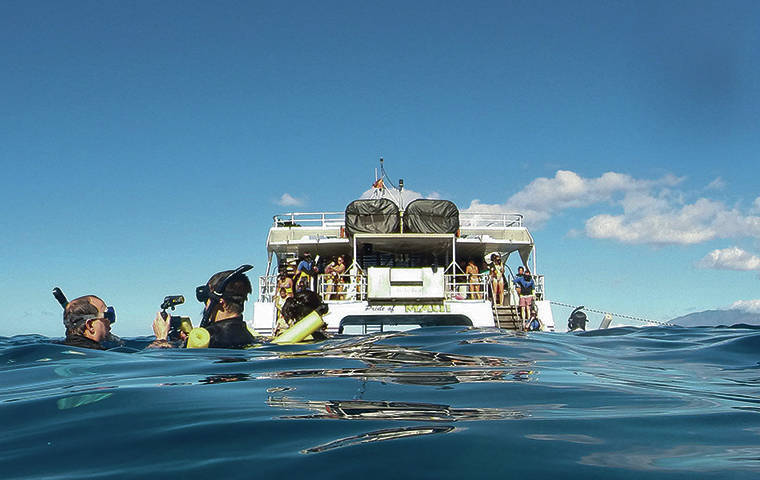To commemorate World Oceans Day on Tuesday, Gov. David Ige signed into law nine bills meant to preserve Hawaii’s aquatic resources which included those establishing fees targeted at visitors, noncommercial fishing licenses and additional protections for sharks.
The new fees would affect tour boat operators, who tend to attract tourists, and nonresidents who want to fish for noncommercial purposes in Hawaii.
House Bill 1019 Opens in a new tab establishes an “ocean stewardship user fee” requiring operators of commercial vessels that carry passengers to collect a $1 fee per customer served or passenger carried.
Dive operations, whale-watching charters and similar businesses would be subject to the fees.
The fees, along with other sources of funding, will be transferred to an “ocean stewardship special fund” meant for the “conservation, restoration and enhancement” of Hawaii’s marine resources.
The law will go into effect at the beginning of 2024 and can generate anywhere from $14 million to more than $30 million over 15 years, the state Department of Land and Natural Resources estimated.
The bill passed after some argued it would hurt small ecotourism businesses that promote conservation. They also wanted fees to target more lucrative industries that they say actually damage the state’s aquatic environment.
House Bill 1023 Opens in a new tab establishes a mandatory recreational marine fishing license for nonresidents in Hawaii ages 15 and older, excluding active-duty military personnel and their families.
A one-day fishing license will cost $20, a seven-day license will cost $40 and an annual license fee will be $70. The DLNR estimates the fees could generate up to $1 million per year.
Noncommercial fishing data, including the number of noncommercial fishers in Hawaii and the number of fish they take from the ocean, are among the most glaring omissions for fisheries managers trying to assess the stock of target fish species.
All noncommercial fishers in Hawaii, up until now, have been able to go fishing without a license. While HB 1023 does not require residents to obtain one, DLNR Chairwoman Suzanne Case said it could be a steppingstone for a noncommercial license for all — if the public wants it.
“We’ll get a system in place, and we’ll get it up and running … and that will be a good mechanism for us to further evaluate whether a resident recreational fishing license might be something that people support in the future,” Case said Tuesday during a bill-signing ceremony at the state Capitol.
Hawaii is the only coastal U.S. state without a registry, permit or license for noncommercial fishers. Data about Hawaii’s noncommercial fishing could be collected if a license was established, but many fishers, who have never needed a license to fish, have not welcomed the idea.
Fisheries managers and scientists generally agree that a license or registry would be helpful. The revenue provided by HB 1023, specifically, could provide the state with necessary funding.
“It helps provide additional revenue to our state to manage our fisheries, and I know that the state really needs all the help it can get when it comes to managing our fisheries,” said Dean Sensui, executive producer of the television show “Hawaii Goes Fishing.”
Sensui also serves on a noncommercial fishery advisory committee for the Western Pacific Regional Fishery Management Council.
Sharks were also given additional protections after Ige signed House Bill 553 into law Tuesday. The bill, first introduced by state Rep. Nicole Lowen (D, Holualoa-Kailua-Kona-
Honokohau) in 2014, has finally become state law and will prohibit people from intentionally catching or killing a shark in state waters.
The law will take effect Jan. 1 and establishes a $500 fine for a first offense, a $2,000 fine for a second offense and a $10,000 fine for subsequent offenses.
Despite the lack of a market for shark products in Hawaii — thanks to a 2010 law that banned the sale of shark fins in the state — there have in recent years been instances in which sharks were captured, mutilated or killed.
Proponents of HB 553 want to stop such incidents and certain charters that they say still target sharks for business.
Shark researchers have opposed for years a bill like HB 553, arguing it won’t be effective at protecting sharks, either because it doesn’t address existing pressures on sharks or because of the DLNR’s lack of resources to enforce the law.
Lowen has previously said that enforcement shouldn’t stop passage of the law, and Case also dismissed the argument Tuesday.
“We always need more capacity to manage our resources,” Case said. “We always do the best we can with the resources we have, and the fact that something is said in law — good people, law-abiding people will follow the law. We’ll just have to tackle situations where people are not following the law.”
The other bills Ige signed Tuesday will allow the DLNR to issue single commercial marine vessel licenses that cover everyone aboard a vessel; allow enforcement officers to do inspections on containers that might be holding wildlife or aquatic life; and give the Board of Land and Natural Resources the ability to make temporary changes to rules such as bag limits and gear restrictions to respond to changes in natural resources.




